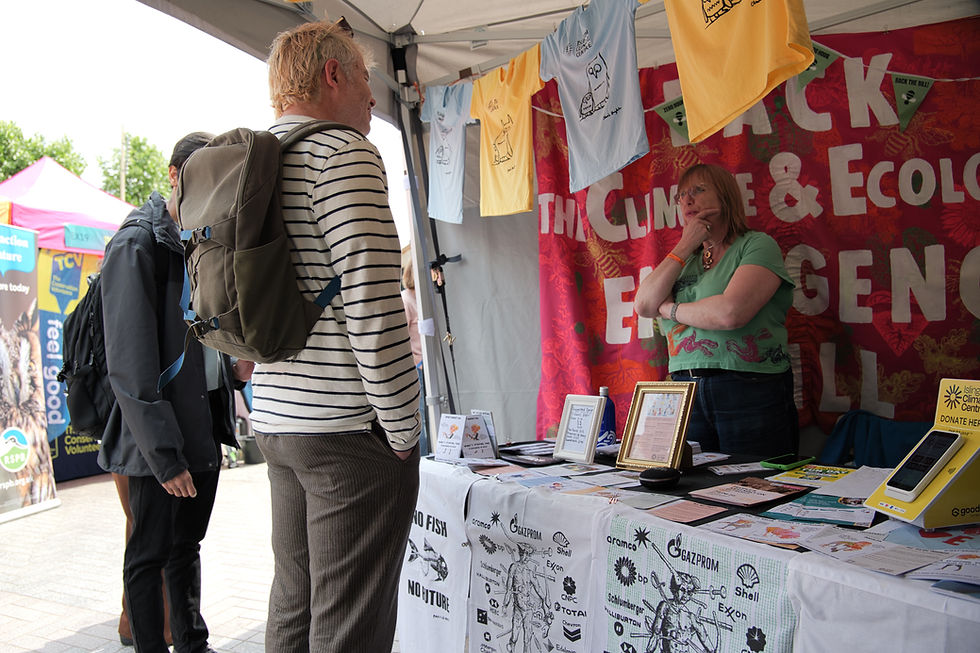Op Ed: Community counts in battling the heatwaves
- Bel Jacobs

- Jun 24, 2024
- 4 min read
Tom Hardy is a former government education advisor and writes on politics and the environment.

On 19th June, I attended a ‘People’s Assembly’, hosted by The Islington Climate Centre, on how we in Islington (and beyond) might adapt to the now inevitable dangerous rise in temperatures as climate change bites. In a month where we have seen more than 1,000 pilgrims die in Mecca as a result of extreme heat we need to be prepared when these conditions reach our shores.
The centre exhibited photographs and personal stories depicting the impacts of global heating curated by Shade the UK who described their mission thus: “As temperatures soared over 40 degrees in July 2022, we collectively witnessed the immense challenges faced by cities, communities and critical infrastructure. Our ‘40 degree stories’ project aimed to get behind the headlines and the statistics, to understand how people are impacted by hot weather, especially the most vulnerable.”
In the best tradition of deliberative democracy, the centre hosted a 'People's Assembly' (a localised version of a Citizen’s Assembly) to brainstorm solutions and set priorities. This event was facilitated by Aneira Roose-McClew, co-founder of Trust the People, and drew on insights from three key stakeholders: Andy Love from ‘Shade the UK,’ Andrew Bedford from Islington Council's Environment Department, and Joseph Jones of The London Tenants Federation.
Breakout groups were then asked two questions: ‘What happens when we experience heat waves reaching 40°C in Islington?’ And ‘What do we need to do to make Islington cooler and safer for everyone during hot weather?’
The answers to the first question were sobering. Heat has enormous impacts on human health. We, especially the elderly, will be at risk of heart attacks, dehydration and heatstroke, as well as tropical diseases such as Malaria, Zika and Dengue fever as disease-bearing insects migrate north from the tropics.
An exhibition of portraits of Islington residents by Shade the UK, an Islington based community interest company (CIC), working to adapt the built environment and public spaces, provided a fitting backdrop to the event. The portraits were accompanied by their experiences of the 40 degree heat wave we endured in 2022.
Work suffered, particularly that of school children. One subject, Tabitha, described teaching in 40 degrees of heat: “We couldn’t teach…not much learning happening because they can't concentrate. They were very moody…some of them were even afraid.”
Another, Pamela, spoke of drugs becoming ineffective in the heat and another, Kirstie, reflected on the mental health implications: “That summer, my little daughter would have been just over a year old at the time. It was incredibly difficult, our mental health suffered enormously because she just could not sleep…she couldn’t be awake either because it was incredibly uncomfortable.”
Commerce failed as people stayed at home. Jonny, who runs a theatre, explained: “With audiences dropping off in this really hot period, that affected us as an unfunded venue…We’re a charity, we’re not a commercial entity so our ability to thrive and survive is based on our ticket income.”
During our emergency planning brainstorm, several common themes emerged, many inspired by European neighbours which had more experience at handling heat waves.
Suggested strategies included painting roofs white to reflect the heat of the sun while keeping windows closed during the day to prevent warm air entering houses; reconfiguring the working day to include a Spanish style midday siesta when the sun is at its hottest, and confining working hours to early morning and late evening.
We also considered taking a lead from Parisians who, during their own extended heatwave, set up outdoor misting and traffic reduction schemes. Other suggestions included reviving public drinking fountains and, of course, planting more trees, establishing more green spaces and rewilding previously manicured parkland.
There was a strong consensus on the importance of community support groups, which proved so effective during the COVID-19 pandemic. These groups could establish community ‘cool hubs’, along the lines of the warm hubs established during the fuel crisis, potentially located in cellars and church vaults. As for an insect invasion, screen doors and windows were seen as essential.
Inspiring as the day was, it was sobering to be reminded that there is no way back for our children. Even if we stopped emitting CO2 today, the climate would continue to warm until the atmosphere purges itself of the excess of insulating gases. And if we cross climate tipping points, heating would be exponential and unstoppable. For this reason, adaptation needs to go alongside continued efforts to mitigate emissions and holding the government to its net zero commitments.
________________________________________________________________________
The exhibition is open Tuesday 25th, Wednesday 26th, Thursday 27th between 12pm and 5pm at the Islington Climate Centre, first floor, next to Wagamama, Angel Central, Islington. Nearest tube: Angel.
Further references:
London Tennents Org: To attain the Mayor of London’s target for London to meet carbon net zero by 2030, many council and housing association tenants can anticipate refurbishment works to their homes. We would like to see fuel poverty prioritised.
For more information on the Mayor of London London Assembly’s approach to Heat Risk in London, please visit: https://www.london.gov.uk/programmes-and-strategies/environment-and-climate-chang e/climate-change/climate-adaptation/heat








Comments